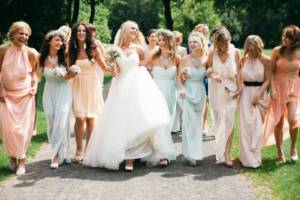German wedding traditions before the ceremony
Observance of rituals in Germany begins long before the wedding ceremony itself. They reflect the most famous character traits of the Germans - humor and neatness.
Tradition of breaking dishes
The ritual called Polterabend is carried out in an atmosphere of fun and enthusiasm. The word itself means “wedding of souls.” It is held in the evening on the eve of the solemn day. In addition to the newlyweds, relatives and friends take part in it, whose task is to bring dishes, most often made of porcelain. It needs to be broken into small pieces, so
After all the dishes are broken, the young people will have to collect the fragments. And at this moment the guests shower them with lentils and peas. Thus, the guests wish the couple a good family life, health and prosperity. The more people are invited to the ritual, the more often good news will visit the house.
A rich table with many national drinks and dishes is traditionally prepared for the ritual. It happens that a guest cannot attend the wedding celebration itself. But he can attend the ceremony of breaking dishes and help the couple protect themselves from the forces of evil. On this date, it is allowed to break any dishes and kitchen utensils, and not only those made of glass. In some areas, couples have toilets brought to their home. The only thing that is not allowed to break is mirrors of any age.
Bachelorette and bachelorette party traditions
This ritual exists in every country in the world; in Germany it is locally called Der Junggesellenabschied. Despite the commonality of the event for many countries, there are also their own special customs. For example, in a number of regions, the groom’s pants are burned at bachelor parties as a symbolic farewell to his life as a bachelor.
The tradition of parents saving their daughter a cent each from her birth until her wedding still has a huge influence. Previously, the currency was called pfennig. On the eve of the celebration, the girl used the funds raised to buy wedding shoes for herself. This ceremony showed that the girl would become an excellent housewife and a faithful wife. On the day of the celebration, 1 cent is placed in the young woman’s shoe. Such a simple ritual will help a young family avoid running out of money. Such traditions allow the Germans to preserve the national customs of their country in their memory.

Buying wedding shoes
Before the wedding, the bride goes through many stores, trying to find the necessary jewelry and details of her wedding look. But she must buy shoes only with coins. As mentioned above, fundraising for the purchase of shoes for a girl begins from her early childhood. This tradition makes it possible to instill in a girl the traits of an economical and prudent housewife. Which will soon have to deal with the distribution of the family budget.
After the wedding
Close friends of the bride and groom try to visit the place where the wedding night will take place in advance and leave them some kind of funny surprise-joke. For example, lay out a sheet with piquant drawings and inscriptions. Or put some adult toy in the nightstand. Or fill the bedroom with balloons so that the young people have to burst them or throw them out the window. Or maybe hide several alarm clocks in the room, set for different times - they say, there is no need to sleep, dear newlyweds, on your wedding night.
In general, Germans have a wonderful sense of humor. Their weddings are cheerful and not at all as prim as, for example, English weddings .
Rituals and traditions on the wedding day
A wedding in Germany begins with a traditional registration. To which relatives, friends and acquaintances are invited. After completing the marriage registration procedure, the couple goes to the local church to get married.
Usually the ritual begins early in the morning and ends before 12 noon. In Germany, this time is considered the most favorable for the emergence of a new unit of society. For the sake of maintaining traditions, Germans can even resort to cunning. If the couple did not have time to go through all the stages of the celebration before the agreed time, the hands were deliberately moved back, even in churches.
The young groom arrives for the bride in a carriage consisting of horses. At the same time, on the way to church, the young bride should not turn back. If she does this, the marriage will not last long. During the journey, the couple is accompanied by a motorcade with relatives and friends. The task of which is to shower the path of the couple with rose petals. According to German beliefs, the aroma of a rose, like the queen of flowers, will help a couple maintain health and have strong and friendly offspring.
Next, according to customs, the girl must put a special wreath on her head, which is strewn with precious stones. Moreover, it is not advisable for her to take it off until the first night with her husband. If the bride is getting married for the first time, her wedding bouquet, as usual, consists of myrtle wood. During the ceremony of service in the church, the couple should stand, clinging as closely as possible to each other. This position symbolizes their unity and the fact that now they cannot do without each other. In their hands are candles, which are tied with a red ribbon.

Ritual of planting a rose bush
Roses have a special meaning in the culture of ancient and modern Germany. It is not surprising that even in today’s culture, the custom of planting a rose bush on the day of marriage by the newlyweds themselves is widespread. Generally speaking, planting trees is considered a natural duty of every self-respecting young man from Germany.
There is a custom in the vicinity of the city of Leising, according to which each groom must have time to plant 6 trees before the wedding day. If he doesn’t have time to do this, the girl should think about the man’s level of responsibility. If he is not able to cope with such a simple task, then what can we say about responsibility for his young wife and children. It is because of this tradition that the city is recognized as flourishing.
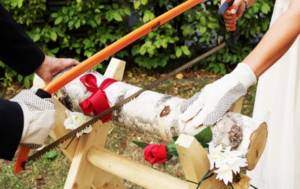
The procedure for sawing a log and its meaning
After the wedding process in the church, another interesting local ritual awaits the couple. The log is placed on special sawhorses and the young people must cut it together. The peculiarity of the ritual is that it must be done with the help of an old and rusty saw, and the log can be quite large in size. The main essence of the ritual is for the couple to understand the need for unity when problems arise. Moreover, both at the personal and everyday levels. The division of responsibilities into feminine and masculine principles is very arbitrary.
Only after sawing the wedding log does the traditional fun begin. The motorcade's cars line up exactly in one line and head to the pre-designated location for the banquet. Each vehicle has a white identification ribbon attached to the antenna. There is noise and commotion all around, the cars do not stop talking for a split second.

Bride kidnapping tradition
The witness, during the festive fun, kidnaps the young woman and hides her in a secluded place nearby. A period of testing begins for the young man, during which he must not only cope with all the difficulties, but also free his beloved as quickly as possible. Speed is also important because the groom will have to pay for everything that the girl has time to eat and drink during the games. The tradition has not outlived its usefulness today, retaining its influence since ancient times.
German version of the game of forfeits
This funny and beloved game is familiar to almost everyone since childhood. And almost no celebration in Germany is complete without it. Moreover, at a German wedding it has its own characteristics. The notes that are distributed to the guests contain proposals with gifts that they will give to the newlyweds. Often, tasks are given as forfeits to supply a couple with food or household utensils for a certain period.
Thanks to such a fun competition, the couple will be able to live a certain amount of time without needing the food and household items indicated on the pieces of paper.
It is worth noting that the older generation of both families takes care of forfeits and tasks in advance, helping the young ones to wisely benefit from the situation.
Sprinkling guests with grain and salt
Wedding traditions in Germany require the bride to generously shower her guests with the aforementioned products. For such a ritual, secret pockets are sewn into the dress, where she puts the necessary ingredients for the performance. With this simple action, the family will attract wealth and a comfortable life. In German traditions, the ritual came from the belief that a generous person always gives less than he receives from the Universe.
Jokes on your wedding night
Unlike a number of other weddings, in German tradition it is customary to present the newlyweds with pleasant surprises for their first night together. Before the wedding ceremony, relatives and friends have the right to visit the couple’s sleeping area. During the visit, they quietly leave surprises for the newlyweds with, at times, unambiguous content.
A bunch of balloons are scattered around the room, through which the couple will have to go in order to get to the coveted bed. And also, just for fun, they could set alarm clocks for the early hours, hiding them in the most secluded places of the room.
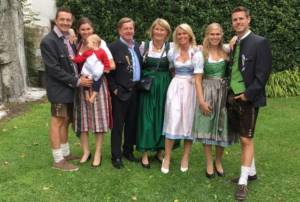
What stages is the wedding ceremony divided into?
The German wedding script includes several stages based on events that occur before, during and after the significant day. One thing can definitely be said: everything seen and experienced will certainly give you the most vivid impressions and memories.
From the point of view of observing formalities, in Germany a distinction is made between a civil ceremony and a church ceremony. Unlike Russian weddings, everything that happens in the local registry office is not particularly pompous and eventful.
Marriage takes place with a small number of people and sometimes even without festive attributes. But a wedding in a church is at the same time a magnificent, enchanting and solemn event.
What happens before the wedding
An important event in the life of the newlyweds is preceded by a preparatory stage. It all starts with the couple’s relatives, acquaintances and friends working together to create a wedding newspaper. It tells the story: how the relationship began, where the future spouses met, how events developed further.
All these notes are intertwined with funny incidents from their lives, photo collages, joint photographs, interviews with people who happened to observe the process of forming a new family. The collected material is presented to all guests at the festive banquet as a souvenir for a long memory of the significant event.
The traditional pre-wedding party is a party organized by the bride at her parents' house.
Nobody sends out official invitations to the event, since visiting it is an event that logically follows from everything that happens at this stage. Everyone knows about it, and therefore everyone decides for themselves whether to go to it or not.
Usually the bride's parents set the buffet, but it is considered quite appropriate for the guests to bring their own treats. Mostly baked goods, alcohol, snacks. This dinner has its own name - Der Polterabend. It functions as a kind of dress rehearsal for the main celebration.
The highlight of the event is the fascinating beating of dishes and household utensils, which all those present bring with them specifically for this purpose. It can be:
- table services,
- figurines,
- flower pots,
- vases
Future spouses need to collect all these fragments and shards. And the better they do this, the greater the chance that the marriage will be happy. This tradition is intended to bring happiness to the newlyweds, and the broken glass is supposed to drive away evil spirits from their family hearth.
Another ritual will have to be observed when the bride purchases wedding shoes. It is believed that the young lady had to collect money for her from childhood: this indicates that the future wife will be thrifty and thrifty.
Wedding day
A traditional wedding begins with a civil ceremony at the marriage registration office. Only the closest relatives are present here. Next comes the church wedding ceremony. The best time for it is considered to be before noon.
Yemens believe that the morning sun's rays increase the happiness of newlyweds. In ancient times, if the ceremony could not be held in the first half of the day, the church ministers would change the clocks so that everything would look proper.
On the wedding day, which in Germany is called Die Hochzeit, the groom picks up the bride and groom from her parents' house in a horse-drawn carriage. At the same time, the bride is strongly discouraged from turning back, since this is the surest path to a second marriage.
The wedding procedure begins with the newlyweds entering the church together arm in arm along an aisle strewn with pink petals. A wreath inlaid with beads and precious stones is placed on the young wife's head. She must wear it until the end of this day. In the hands of the newlyweds are candles entwined with ribbons and flowers.
The wedding bouquet of the girl, for whom this is the first marriage, consists of myrtle. This tradition was introduced by Queen Victoria, whose daughter married the German emperor. The ritual has caught on, so modern brides always insert a sprig of myrtle into their bouquets.
The wedding procession can be recognized by the white ribbons that are attached to the antennas on the cars and by the loud horns. But the festive dinner is paid for by the parents of both parties in equal shares.
What happens after the wedding
After the festive fireworks have died down, but the newlyweds have not yet rushed off on their honeymoon, another dinner is organized to coincide with this event. The Germans celebrate this day in the bride's parental home or where the young family will live. Usually this event is a continuation of the first wedding day.
And this is where the real fun begins. This event is always marked by competitions, entertainment, and eating what is left from the previous day. It will be considered successful if there were many children there.
As in Russia, it is customary here to steal the bride. In Germany they hide her, and the young husband, with the help of special clues, must find his beloved.
As a penalty for neglecting his duty to take care of his spouse, he can offer the kidnappers a ransom, sing, dance, or promise to perform some duties around the house. By the way, the Germans have their own style in the interior, which you can learn more about here.

Traditional outfits for celebrations in Germany
The basic outfit of a German bride is almost no different from its European counterparts. The only caveat is the need to have a wreath of exclusively white flowers with a myrtle branch inserted into it. This plant symbolizes the blessing of heavenly powers, as well as longevity. Myrtle should traditionally be present in the bride’s wedding bouquet.
After the celebration, the bouquet and wreath are kept in the house away from prying eyes as family treasures and are often passed on by inheritance. There are also no requirements for the groom's suit; he can choose the color and style at his discretion.
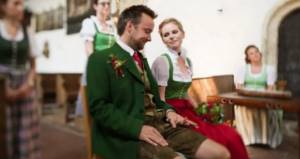
Wedding feast traditions
The parties plan the wedding menu with special care. There are almost no restrictions, the only condition is the number of dishes: there must be at least 20 of them. In this case, guests, if desired, can take treats from the wedding table to their home. The wedding table menu is usually varied and depends on the location of the ceremony. For example, in the Lower Rhine, soup with meat, potatoes, and sauerkraut are especially revered. In Bavaria, they prefer noodle soup, fried sausages and baked carp.
By the way, in Bavaria you can try traditional German wedding soup. It even has its own name - bridesmaid. It consists of meat broth prepared according to a special recipe with the addition of pieces of bread. In it, guests may come across such items as wood chips, parts of brooms and other, at first glance, unnecessary little things. But according to local customs, if the bride tastes this soup herself, she will become an ideal housewife even with minimal experience.
The symbolism of the cake played a special role in the celebration. It traditionally had 5 main layers, which symbolized the 5 main stages of human life from birth to death.
The end of the wedding feast is symbolized by walking along a path made of pine needles. It is this plant that is believed in Germany to be able to bring financial wealth and a stable position into a couple’s life. During the passage, the newlyweds are traditionally sprinkled with rice.
It’s also worth saying a few words about the newlyweds’ first dance. Afterwards, the bride invites her father to dance, and the groom, for his part, invites his mother. The dance program should be completed by a couple of the groom's mother and the bride's father performing a waltz.

What happens after marriage registration?
After registering a marriage, according to an old German tradition, the newly-made husband and wife are supposed to cut a real log with a real saw. This kind of work is not the easiest, and not everyone can handle it, but the newlyweds must show the guests what they are capable of. And this is not only physical strength, it is also the ability to achieve your goals. This tradition is quite old, but the Germans loved it so much that they continue to follow the custom to this day. Only now sawing a log also means equality, because this goal can be achieved only if you correctly arrange your forces, be able to not only hear, but also listen to each other, and do everything together.
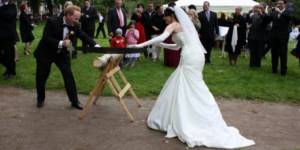
Regarding the famous bride kidnapping, we can say that such a tradition exists in some regions of Germany even to this day. But it has strange rules: the groom’s friend “steals” the bride in one of the local bars, where the groom must find his beloved. The groom can walk around the establishments for a long time and have a lot of fun, because in every bar where the bride is not there, the newly-made husband must drink an alcoholic drink, also treating his friends. And when the bride and her kidnapper are found, the groom must pay their bill as well.
But instead of the usual throwing of a bouquet to unmarried girlfriends in Germany, there is a tradition called the “Veil Dance.” During one of the final dances, unmarried wedding guests must tear off a piece of the veil. This will mark an early marriage.
The veil dance in some regions is a completely different tradition, which involves those wishing to dance with the bride or groom having to put money in the veil.

The stage of preparing gifts for the newlyweds
The tradition of collecting gifts for newlyweds deserves special attention. Here it is important to pay tribute to the foresight of the Germans in this matter.
In Germany, most often, guests are sent notes with gift options, as well as dates when it will be convenient to receive them. Usually, when the newlyweds arrive, many gifts await them. The best part is that most of them will be useful to them for their future life together and comfortable.
The second method of congratulations is monetary compensation for the wedding. In Germany, some couples specifically open wedding accounts. Anyone can transfer the required amount of money to them. Sometimes a box is installed at the holiday venues where guests can drop off wishes if necessary. The material side of the gift depends on the bloodline closeness with the invited guest of the bride or groom.
Symbolic wedding in Germany
It is no secret that organizing a wedding in another country with a different culture is a rather troublesome and difficult task. Therefore, trying to solve the problem on your own would not be the best idea. Especially for a person who is not familiar with the culture and characteristics of a given people. Solving the problem on your own will require additional costs of finance and energy. If we consider the wedding process in stages, we can distinguish the following main stages:
- selection of a wedding ceremony venue;
- hotel reservations and the process of purchasing round-trip tickets;
- registration for the registration procedure directly at the local registry office;
- selection of topics for the event;
- procedure for renting a car and ordering a restaurant or banquet hall;
- obtaining a permit for temporary entry into the country.
If you want to save money, experts advise purchasing a wedding dress and rings at home. If the issue of finances does not play a significant role, it is better to entrust the conduct and organization of the event to a trusted person called a wedding planner.
The difficulty is that for an interethnic marriage you will need to additionally obtain a fiancé visa. To submit a well-written application for such a document, a man needs to confirm his financial independence and solvency to fully provide financial support for his future family.
Results
A wedding in a foreign country is always romantic and unforgettable. Germany is perfect for such purposes. There is everything for this: picturesque landscapes, ancient traditions, the willingness of the Germans to turn even the most modest celebration into a significant event.
The German wedding ceremony has two forms - civil and church. Moreover, the first is a purely formal procedure for many couples. But a wedding in a church is a truly important event, preparations for which begin long before the appointed date.
You can choose one of the country's many castles as the venue for the holiday, but it is better to entrust the preparation of the event to a wedding planner. This may not save money, but it will save you from a lot of hassle. If you are interested in how same-sex marriage works in Germany, read our publication.
Approximate calculations and expenses of the ceremony
It's no secret that a wedding in any country in the world is a rather expensive undertaking. According to expert statistics, the average bill for one wedding in Germany can reach 11,000 Euros and more. Despite such high figures, only about 7% of newlyweds decide to abandon their honeymoon in favor of rationally saving financial resources. Some were not too lazy and made approximate estimates of the necessary expenses of couples for organizing such a long-awaited, albeit expensive event:
- a wedding dress for a bride can cost a family 1,600 euros or more, depending on the quality of the product and the level of the family’s wealth;
- about 500 euros are spent on makeup and hair;
- rent of banquet halls can reach up to 700 euros. Here, too, such indicators as the prestige of the restaurant, its location, the number of guests and other factors play an important role;
- Costs for decorating a hall can reach up to 1000 euros at a time;
- purchasing wedding rings can cost a couple up to 3,000 euros;
- decorating a table for a wedding can cost 150 euros per person, multiplied by the number of invitees, newlyweds and witnesses;
- a designer wedding cake often costs families up to 700 euros;
- Crew rental for young people usually costs up to 1000 euros, depending on the class of service;
- registration and purchase of invitations up to 600 euros;
- musical accompaniment of the ceremony is quite expensive and can reach 4000 euros, depending on the qualifications of the musicians;
- The state fee is fixed and equal to 100 euros per ceremony.
Due to such colossal costs, some young couples have to take out loans to properly organize their wedding. But there are families where the parents help the couple cope with financial difficulties at first. Often, families of the older generation get together and divide the total amount of expenses in half, trying to compensate for the costs with gifts from guests.
It is worth considering the question of what is traditionally given to newlyweds at German weddings. There are usually no special wishes or restrictions in this matter. Usually, the couple makes a list of things they need in the future in advance. And then they send out lists to the guests. If such an event was not held, then finances have always been and remain the best gift.
A German wedding is the observance of very ancient local traditions that have withstood the temporary onslaught. The ceremonies usually last 3 days, during which you can fully immerse yourself in the traditions and culture of the local population.
Polterabend, or pre-holiday party
One of the most popular traditions is called Polterabend. This is a kind of party that is held at the bride's house. Many people compare the event with a bachelorette or bachelor party, but this is not entirely true. No guests are invited to Polterabend, since everyone who knows about this party and considers it necessary to come comes for no reason. The Germans call this day the rehearsal dinner, and the bride's parents prepare it in a buffet format. One of the features of the holiday is that any guest can contribute and bring some pastries, snacks or alcohol to the table. In general, the name Polterabend comes from the word poltern, which means “to make noise”, “to rumble”. This is where the main highlight of the holiday lies: guests must bring with them vases, dishes, pots and in general anything that can easily be broken in front of the windows of the house. According to legend, the sound of breaking dishes should disperse all evil and unfriendly spirits. But the bride and groom should not forget that it is their responsibility to remove the fragments in order to prove their unity, and the more fragments, the better. After all, dishes are broken for good luck, and such a tradition before a German wedding in Germany really lifts your spirits.
